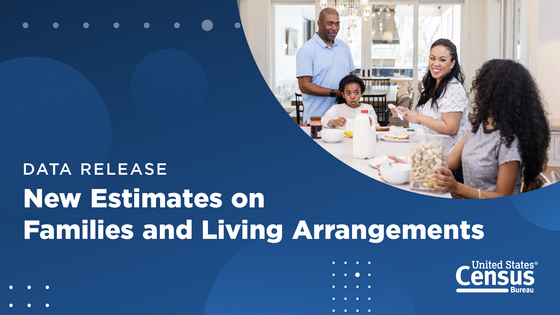Newly released estimates from the U.S. Census Bureau’s historical America’s Families and Living Arrangements tables show that about 64% of households were classified as family households in 2024.
Source: Census Bureau
This marks a significant change from 50 years ago, when 79% of households were family households. Family households are defined as those that include at least one person related to the householder by birth, marriage or adoption.

In 2024, almost three-quarters (74%) of family households were married-couple households. Family households that did not include a married couple were more likely to have a female householder (68%) than male householder (32%). Among nonfamily households, about 52% included a female householder, while 48% had a male householder. A substantial portion of nonfamily households were homes with someone living alone — 81% in 2024 compared with 89% 50 years ago.
Newly released estimates from the U.S. Census Bureau’s historical America’s Families and Living Arrangements tables show that about 64% of households were classified as family households in 2024. This marks a significant change from 50 years ago, when 79% of households were family households. Family households are defined as those that include at least one person related to the householder by birth, marriage or adoption.
In 2024, almost three-quarters (74%) of family households were married-couple households. Family households that did not include a married couple were more likely to have a female householder (68%) than male householder (32%). Among nonfamily households, about 52% included a female householder, while 48% had a male householder. A substantial portion of nonfamily households were homes with someone living alone — 81% in 2024 compared with 89% 50 years ago.
This release features an interactive data visualization on family households that includes a drop-down menu to compare living arrangements by householder age.
Here are some other highlights:
Households:
- In 2024, there were 38.5 million one-person households, which was 29% of all U.S. households. In 1974, one-person households represented only 19% of all households.
- As the population ages, the portion of householders age 65 and older has increased from about 1 in 5 50 years ago to over 1 in 4 in 2024.
Families:
- The percentage of families with their own children under age 18 in the household declined from 1974 to 2024. In 1974, 54% of all U.S. families lived with their own children under age 18, compared to 39% in 2024.
Marriage:
- In 2024, 34% of adults age 15 and over had never been married.
- The estimated median age to marry for the first time was 30.2 years for men and 28.6 years for women in 2024, up from ages 23.1 and 21.1, respectively, in 1974.
Living Arrangements:
- In 2024, more than half (57%) of adults ages 18 to 24 lived in their parental home compared to 16% of adults ages 25 to 34.
These statistics come from the Current Population Survey Annual Social and Economic Supplement, which has collected statistics on families for more than 60 years. The data show characteristics of households, living arrangements, married/unmarried couples and children.
For more data on families and living arrangements, visit Families and Living Arrangements at census.gov. Visit America Counts to learn more and read the feature story about this release.









![“Seven Nights of Lights and Luminarias” Among Most Read Articles in 2024 [#7]](https://lascrucesdigest.com/wp-content/uploads/2024/12/Luminarias-Old-Town-dm-1000x500_4F39B06A-5056-A36A-06831FDB1E06DF9C_4f3c202e-5056-a36a-0667e4166bf66da1.jpg)